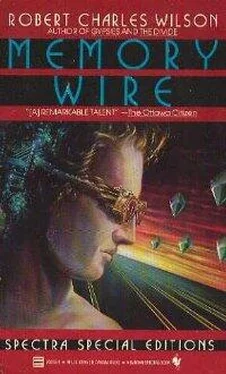Robert Wilson - Memory Wire
Здесь есть возможность читать онлайн «Robert Wilson - Memory Wire» весь текст электронной книги совершенно бесплатно (целиком полную версию без сокращений). В некоторых случаях можно слушать аудио, скачать через торрент в формате fb2 и присутствует краткое содержание. Год выпуска: 1987, ISBN: 1987, Издательство: Bantam Spectra, Жанр: Фантастика и фэнтези, на английском языке. Описание произведения, (предисловие) а так же отзывы посетителей доступны на портале библиотеки ЛибКат.
- Название:Memory Wire
- Автор:
- Издательство:Bantam Spectra
- Жанр:
- Год:1987
- ISBN:978-0-553-26853-9
- Рейтинг книги:4 / 5. Голосов: 1
-
Избранное:Добавить в избранное
- Отзывы:
-
Ваша оценка:
- 80
- 1
- 2
- 3
- 4
- 5
Memory Wire: краткое содержание, описание и аннотация
Предлагаем к чтению аннотацию, описание, краткое содержание или предисловие (зависит от того, что написал сам автор книги «Memory Wire»). Если вы не нашли необходимую информацию о книге — напишите в комментариях, мы постараемся отыскать её.
Memory Wire — читать онлайн бесплатно полную книгу (весь текст) целиком
Ниже представлен текст книги, разбитый по страницам. Система сохранения места последней прочитанной страницы, позволяет с удобством читать онлайн бесплатно книгу «Memory Wire», без необходимости каждый раз заново искать на чём Вы остановились. Поставьте закладку, и сможете в любой момент перейти на страницу, на которой закончили чтение.
Интервал:
Закладка:
The aircraft was crowded with peacekeepers in pea-green uniforms, talking among themselves in laconic Ariguaia Valley accents and oblivious to the dark ocean of forest below. Oberg propped his head on a pillow and pretended to sleep. He was 190 pounds, bulky in a gray suit, a plodding but methodical thinker. He was not given to fits of nerves, but he admitted that Brazil made him nervous.
There would have to be changes made. He had tried to impress that on the Agencies and on the government functionaries he had been introduced to in his brief time here. For years the mining of the Pau Seco artifact had been a relatively casual affair; smuggling happened mostly at the research facilities in America and the Asian states, where the oneiroliths were temptingly easy to duplicate. Smuggling from Pau Seco itself was problematic, and for years there had been no good reason to attempt it. The Eastern -Bloc had periodically made its presence felt, but that was to be expected… tolerated, even, within limits. The exigencies of the balance of power. But times had changed.
Oberg had been at the government labs in Virginia when the first of the new stones came in late last year. Technically, the research team leader told him, these new stones were more “addressable”—they interfaced more successfully with the cryptanalytical programs running out of the building’s big mainframes. “We’re downloading all kinds of material,” he said. “Ask for it, it’s there. It’s like an encyclopedia. A bottomless encyclopedia. But the effect on human volunteers …”
Oberg said, “It’s different?”
“Very idiosyncratic. Very strange. You should see.”
And so Oberg, who was the Agencies’ liaison-in-place, had followed the voluble team leader down a hallway to the small pastel rooms where the human volunteers were kept. This was essential research, too, Oberg had been told, though it made him queasy to think of it. Perversely, there were data the computers could not evince from the stones, data accessible to the living mind alone. Everything that was known about the Exotics had come through this route. A blue-skinned people who inhabited, or had inhabited, a small planet of a distant star. Through human volunteers some little knowledge of their language and anthropology had been eked out. But it was sporadic work, and much of it was contradictory, overlaid with dreams and wishes, the excrescences of the human mind.
The volunteer was a man named Tavitch. Like most of their volunteers, he came from the federal prison at Vacaville. Tavitch was a soft-spoken middle-aged man who had murdered his wife and two children a week after he lost his job as a data-base manager, and who chose the Virginia facility as an alternative to amygdalectomy. His eyes were large and moist, his expression faintly petulant. He held one of the new deep-core oneiroliths in his hand.
“First time he touched it, he was practically comatose,” the team leader burbled. “Oculogyric trance. Some kind of traumatic hypermnesia. But he’s relatively lucid now.”
Oberg folded his arms patiently. “Mr. Tavitch? Can you hear me?”
Tavitch looked up, though his expression was preoccupied.
“What do you see, Mr. Tavitch?” There was a long pause. “Time,” Tavitch said finally. “History.”
It was eerie, unpleasant. Oberg looked at the team leader. The team leader shrugged and waved his hands: go on.
Oberg sighed inwardly. “History,” he said. “Our history?”
“Our history,” Tavitch said, “their history. Ours is newer. Oh, it shines! You should see it. It’s like a river. A golden river of lives. Millions and millions, fading away back as many years.” His eyes were glazed and patient. “They’re ail in there…”
“Who?”
“Everybody,” Tavitch said. “Everybody?”
“The dead,” Tavitch said calmly. “Lives tangled up like strings. The living too—more like fuses. Burning.”
Oberg had shuddered. It was the instinctive revulsion he inevitably felt in that room. A sense of contamination. People assumed the oneiroliths had been tamed, that their familiarity had taken the edge off their strangeness. For Oberg, at least, it wasn’t even remotely true. They were the product of an intelligence that was profoundly and dissonantly inhuman. You could tell by looking at them—the oily shine of them, the illusion of depth. Stone mechanism, he thought. Mineral life. It made him uneasy.
“They’re in here too,” Tavitch said, and his voice descended now into a minor key.
“Who, Mr. Tavitch?”
“ Alma. Peter. Angela.” The convict’s face seemed to collapse into itself. Oberg was stunned. He thought the man might cry—Tavitch, the murderer, who had never demonstrated any sign of remorse. “They want to understand,” Tavitch said, “but they don’t… they can’t…”
Oberg left the room, repelled.
Alma, Peter, Angela.
They were Tavitch’s family … the ones he had killed.
Later, over lunch in the sterile staff cafeteria, the team leader had tried to talk away the event. “You understand, we’re working here with selected subjects. Criminals. Murderers, like Tavitch. So the work has a certain bias built into it. Conventional research hasn’t given us everything we’re looking for. We’re very little closer to understanding who the so-called Exotics are, or how an oneirolith interacts with the mind—or why—than we were fifteen years ago.”
“It’s unnatural,” Oberg had-said. “It’s ugly.”
The team leader blinked. “I follow your concerns, Mr. Oberg. All I’m suggesting is moderation. Patience. Look at it from our point of view. Communication is what we’re all concerned with here. And communication—of one kind or another—is what happened in that room with Tavitch. There’s this prejudice against what’s called ‘the human interface,’ the effect of the oneiroliths on the human mind. Well, obviously it’s a difficult study. The effect is subjective. You can’t measure it or calibrate it. So we do a limited kind of research, and we have to compete for funding with people who are downloading much harder data. You see what I’m driving at? I know you had a negative reaction to what happened today, but I wouldn’t want that to affect the course of our work.”
So it comes down to this, Oberg had thought: this man’s, career. “I don’t control funding.”
“You have influence.”
“Only a little.”
“Still, I’m convinced we’re doing important work, vital work, with these new stones. No one wants to consider it, Mr. Oberg, but maybe the real message the Exotics left us isn’t strictly linguistic. Maybe it’s preverbal. Maybe it operates on the level of intuition … or emotion … or memory.”
Memory. What was it Tavitch had said? Something about history. And the team leader had talked about hypermnesia, an involuntary upwelling of the past. To Oberg all of this seemed obviously, patently sinister. The past was the past, a burial place, the tomb of events, and better that way. Nobody cared about the past but priests and poets. You did a thing and you left it behind you. Hypermnesia, he thought, Tavitch’s “history,” was a light cast into places that by all rights should have been dark, hidden, buried.
Briefly, Oberg felt a wave of what the Army psych officers had called “depersonalization”—a sense of standing apart from himself, a disconnection. For one crystalline moment he understood that his horror of the alien stones might be purely personal, a pathology, a self-disgust as profound as he had seen in Tavitch this afternoon. A phobia of memory. He gazed at the bland, pale face of the man across the table and thought: if you’d seen what I’ve seen —if you’d done what I’ve done—
Читать дальшеИнтервал:
Закладка:
Похожие книги на «Memory Wire»
Представляем Вашему вниманию похожие книги на «Memory Wire» списком для выбора. Мы отобрали схожую по названию и смыслу литературу в надежде предоставить читателям больше вариантов отыскать новые, интересные, ещё непрочитанные произведения.
Обсуждение, отзывы о книге «Memory Wire» и просто собственные мнения читателей. Оставьте ваши комментарии, напишите, что Вы думаете о произведении, его смысле или главных героях. Укажите что конкретно понравилось, а что нет, и почему Вы так считаете.












